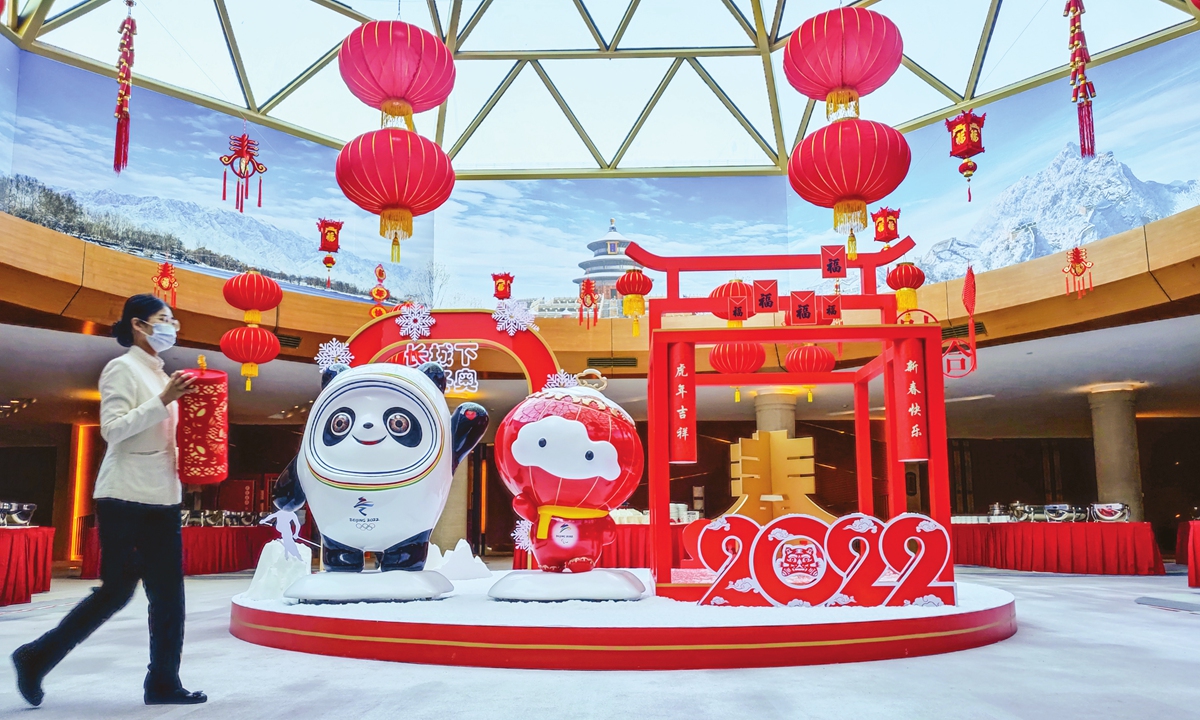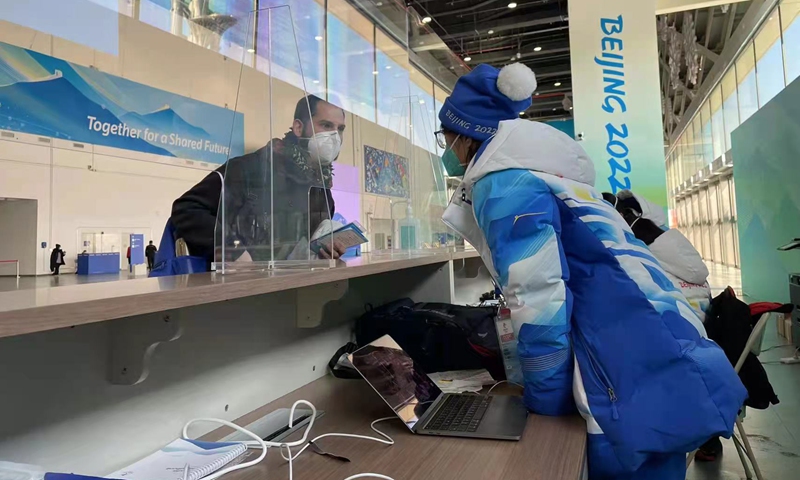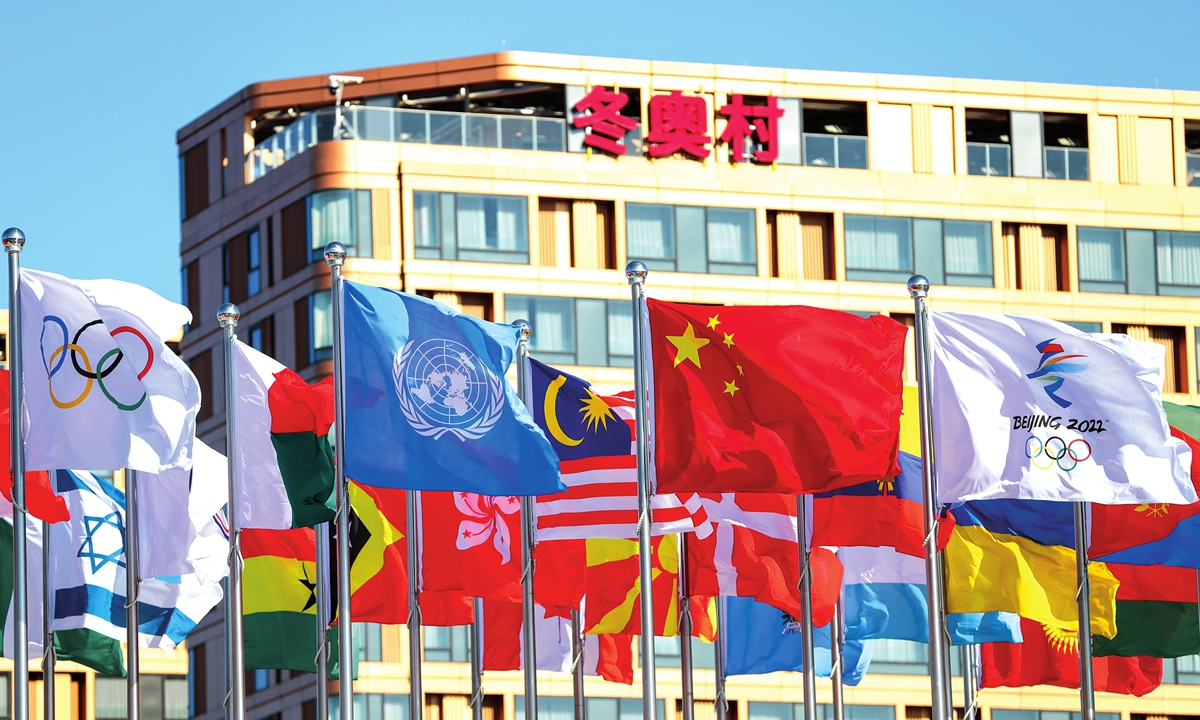
A staff member walks past mascots for Beijing 2022 Winter Olympics at the Beijing Media Center on January 29, 2022. The media center serves reporters without official Olympic accreditation. Photo: VCG
In two days, Chinese people will celebrate the most important family reunion of the year, as the Year of Tiger symbolizes courage and strength - qualities that can rekindle the public, after about two years of living with COVID-19, with some new hope.
Unlike the atmosphere of the 2020 Chinese New Year which was clouded with fear of the unknown at the early stage of the COVID-19 outbreak, and the situation when many gave up their plans of returning to their hometown in 2021 due to sporadic outbreaks, the upcoming festival in 2022 would be an unforgettable and unique one. As China formulated an integrated top-down mechanism in carrying out the zero-tolerance dynamic policies accurately and effectively over the past two years, many people can go back home and enjoy family reunions for the third Chinese New Year amid the pandemic. However, others chose to stay put, to prepare and work for the Beijing 2022 Winter Olympics - an occasion when China reopens the door to the world in a decisive yet prudent manner as the pandemic has yet to end.
Some said that the Winter Olympics in Beijing will be an occasion to communicate with the world without Zoom and Skype, and can show the true face of China and Chinese people, after the pandemic had made the world a much more divided place with growing racism, misunderstandings, hatred and demonization.
When it's time to say goodbye to the Year of the Ox, some people raised questions about what has the pandemic changed and has not changed, what are the widely shared wishes of ordinary Chinese people for 2022, and what are their New Year's resolutions. When China faces new challenges in communicating and interacting with the outside world amid the US-led geopolitical wrestling, what are their expectations for the Winter Olympics as a new channel of communication between East and West?

Volunteers of the Beijing 2022 are working at media center which started to operate 24 hours a day on Monday. Photo: Zhang Changyue/GT
Stronger nation and people "I hope the pandemic ends in 2022, and ordinary Chinese people could live better lives, as some recent epidemiological investigations revealed how hard life has been for some people amid the epidemic," an Olympic volunteer surnamed Wu from the Beijing Foreign Studies University, who now works at the Beijing organizing committee, told the Global Times on Saturday.
A recent epidemiological investigation deeply touched many people after it revealed a migrant worker's tough working schedule of bouncing around some 30 places in Beijing to carry construction materials until dawning.
Over the past years, we got used to wearing masks, taking nucleic acid tests from time to time, and scanning our health QR codes wherever we go, and online classes and virtual meetings are also part of our daily lives, Wu said, but Chinese people came together stronger and much more unified and helped each other in difficult times.
China has witnessed about 30 sporadic outbreaks and partial city lockdowns in 2021 with as many as over 200 high- and medium-risk areas in the most severe situations. But with the "Tianjin speed" and the "Shanghai model" - the miniature of China's dynamic zero tolerance policies - authorities have contained the virus spread in the fastest pace with minimum impact on overall social and economic activities.
"Compared to other countries, the impact of the pandemic on China is the least. Although we have encountered some problems and complicated situations in dealing with the pandemic, we see the overall society being positive as our grassroots social management and top-down governance stood the test of the epidemic," Zhang Yiwu, a professor of cultural studies at the Peking University, told the Global Times on Saturday.
When the outbreak first hit us during Spring Festival in 2020, China was almost the only place affected by it. After two years, more countries are still struggling with the pandemic, and China has returned to a stable path, serving as the backbone for the global recovery, he said.
China posted an 8.1 percent GDP growth in 2021, defying market expectations and further cementing the world's second-largest economy's leading position in the global economy's recovery from the still raging COVID-19 pandemic.
Although China has been attacked more frequently by the US-led Western clique over issues like human rights in the past year, the Chinese government put human rights above all, valuing people's lives and bringing COVID death down to almost zero. Such a move will also inject confidence in the governance led by the Communist Party of China, observers said.
Compared with about 850,000 American people who died in the pandemic, which comes to 2,551 per 1 million, China recorded a death toll of 4,636 since January 2020, which is three people per 1 million, making the US fatality rate about 650 times higher than China's.
However, fighting the pandemic amplified some social problems and divergences not only in the US but also in China. For example, some controversial stories such as an 8-month pregnant woman losing her baby after being left waiting outside a hospital for two hours in Xi'an and subway passengers being trapped in the deadly flood in Zhengzhou sparked public outrage, leading to collective reflections and punishments that eventually helped improve governance.
"When major powers like China and the US encounter such unprecedented crises, which completely disrupted the economy, supply chain and social landscape, they would see a growing number of social problems. But the one who can better tackle those problems will surely win the opportunities for long-term growth," Zhang said.
China's National Health Commission said on Saturday that the domestic epidemic has entered an overall stable situation. However, a research fellow with the Chinese Center for Disease Control and Prevention warned of the risk of domestic flare-ups during Spring Festival, although China won't see any large-scale outbreaks considering its effective measures.
"Both global and domestic outbreaks are not over yet, and the frequent human migration and family gatherings for dinners and parties would increase the risks of domestic flare-ups," he told the Global Times on condition of anonymity.
The risk was particularly high inside the closed-loop bubbles of the Winter Olympics, and it's possible that working staff for the Beijing 2022 and athletes would be infected with the virus, he said, noting that all personnel under the closed loop management, however, are subjected to daily nucleic acid testing that would ensure the time window for further spread to be very short.
"I'm confident that there will be no large outbreak inside the closed loop and the disease is unlikely to spread outside the closed loop," the expert said.

The three Olympic Villages in Beijing, suburban Yanqing and adjacent Zhangjiakou officially open their doors to athletes from around the world for the Beijing Winter Olympics on Thursday. The Beijing village will predominantly house athletes competing in sports such as skating. Photo: VCG
Expectations and confidence As the most important Chinese festival approaches, a number of
foreign heads of state, officials of international organizations and ambassadors to China extended their Chinese New Year wishes to the Chinese people, expecting the Winter Olympics in Beijing as a great sports reunion.
For some people who live in Chinese cities and regions such as Hong Kong and Xinjiang that have been frequently cited by US politicians in slandering China, they also witnessed both changed and unchanged aspects of their lives, seeing their personal life journal attached to the nation's future prospects.
Dake, a 27-year-old woman of the Kazak ethnic group from Ili of Northwest China's Xinjiang Uygur Autonomous Region, told the Global Times on Saturday that the most impressive thing in 2021 was that her hometown built an airport.
"Before, it usually took me a lot of time to go back home. But last year, the airport in Zhaosu county was completed. This airport is only 50 kilometers away from my home," Dake said.
"The airport had its maiden flight on Friday, which means I depart Beijing in the morning and will arrive home in the afternoon and enjoy the delicious meals my mother made for me!" she said.
Living along with the COVID-19 epidemic for the past two years has changed many people's lives, Dake said, noting that the past experience also deepened her understanding that we are members of the big family of China.
Jacky Chung Kit Ko, a local resident in Hong Kong, has been engaging in the work of Hong Kong youth. "Only with the strong leadership of the CPC and the firm support of the motherland can Hong Kong overcome the tests of social turmoil in 2019, the epidemic and economic decline over the past two years," he told the Global Times on Saturday, saying that 2021 was also the turning point for the city to pursue quality democracy.
If there was no pandemic, foreign athletes could have enjoyed beer and BBQ in downtown Beijing. But the ongoing pandemic will leave them some regrets, a local resident in Beijing surnamed Zhao said, noting she believes that a major wish for the new year should be when the pandemic ends, people can finally take off their masks and communicate with each other in a normal way.
"Hopefully, this Winter Olympics would be a good starting point to show the world a true China, dismissing some misunderstandings that certain Western countries hold toward us, though it's still a long way to go," she said.
Zhang Changyue also contributed to the story






